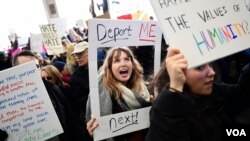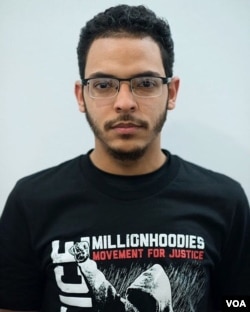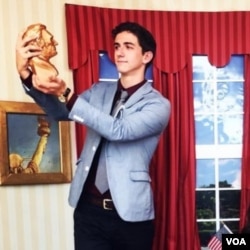College students have been a powerful force for change throughout history.
In the 1970s, students led protests against the war in Vietnam that influenced U.S. policy to draw down its fighting. In 1989, students in China sparked larger protests that forced political and economic reform there. And in 2015, students protested racism at the University of Missouri, which led to the resignation of the university president.
Today's students are active, according to a survey that has measure the attitudes of college freshmen for 50 years. The survey found "an increased commitment to student activism and augmented interest in community and political engagement" in 2015, according to the Higher Education Research Institute (HERI).
"Nearly three-quarters of those who took the survey indicated that helping others in difficulty is an important goal, the highest such result since the question was first asked in 1966," reported HERI's Cooperative Institutional Research Program at the University of California-Los Angeles.
Here are three examples of college students we interviewed who are trying to make a change in their communities.
Getting money out of politics
Cassie Cleary, 21, says politics was not often discussed among her friends in high school. She says she knew of no political groups at her high school in Wakefield, Massachusetts, outside Boston.
But she chose to study political science and history at Syracuse University in New York in 2014. In her second year, or sophomore year, joined a group called Democracy Matters.
Democracy Matters is a national organization working to stop private corporations from giving money to election campaigns. The group teaches students how to become involved.
Cleary says she fears the influence of large, corporate donations on the elections in the U.S. She says she worries about the 2010 Supreme Court decision – known as Citizens United – that allows corporations to spend unlimited money on campaigns.
So she became a leader for her school’s chapter of Democracy Matters.
Cleary organizes events and other students to call their representatives in Congress to express their concerns. She investigates private donations to her university.
Using technology and social media are special tools for change in her generation, she says. Most college students are positioned to be politically involved.
“Let’s be honest. We have more time than the average person because we’re not working,” Cleary says. “We don’t have kids. So I think if we can really get involved in the backbone of these movements, we can move them forward so much more. We have so much more to commit. And we have the energy to do it.”
Helping minority communities
Wailly Compres has a similar story to Cleary’s.
The 21-year-old is originally from Moca in the Dominican Republic and says he did not participate in politics as a youth. Discussing politics in the DR can be offensive and divide people, he says, so people often avoid it, he says.
In 2012, Compres and his family moved to New York City, where he attended an all-Latino high school. He learned that his fellow Latino and immigrant schoolmates also experienced discrimination.
After graduating, Compres looked for a university with Latino interests. He found Bard College, a few hours north of New York City. The school published La Vos, or The Voice, a news and information publication for local Spanish-speakers. That sold him on Bard, where he studies philosophy as part of the class of 2019.
Compres says he wants to connect Latino immigrants with helpful resources. He also wants to change negative attitudes some Americans have about immigrants.
After seeing the news about African-Americans dying during confrontations with police, Compres started a chapter of the Million Hoodies Movement for Justice at Bard. The national student human-rights organization aims to end police violence against African-Americans and other minorities.
But Compres laments that many think only students have time for activism. And he says he wants to change that.
[embed]https://youtu.be/rho6srB5Psg[/embed]
"My main goal right now … is … making college students understand that … when they do activism, they engage in these activities for four years, they leave and they leave certain communities without hope after they leave," he said.
"The activism stops. Another generation comes, it happens again. It stops, and so on. So I think that our main goal now is ‘How do we keep this going?’"
Sharing conservative values
Cade Marsh says he formed strong political opinions at an early age. Marsh, from San Diego, California, calls himself a standard conservative who believes in limited government, personal freedom and individual responsibility.
He started studying law at the "Christ-first" Palm Beach Atlantic University, as described on the university's website, in Florida in 2014. He say he was unhappy with the U.S. government.
"As my generation is spoken to less, and as our opinions are taken and reflected by our elected officials less, we are even less likely to come out and vote," Marsh said. "That sort of trend can only last so long, though, because at the end of the day, we’ve started to reject standard political campaign communication and have started connecting peer to peer."
In early 2015, Marsh joined his school’s chapter of the College Republicans. Created in 1892, this national organization encourages students to join the Republican political party and support conservative goals.
By the fall, Marsh said he'd gathered 500 new members to his group. He also became the executive director of the Florida College Republican Federation. He created his own political action committee (PAC) called Campus Red PAC in 2016. The group raised more than $100,000 to share Republican messages at Florida colleges and to register new voters. And he appeared in the New York Times wearing a "Hillary for Prison" T shirt.
Marsh graduated in early 2017, and continues his political activism. He said he believes young people will always be a major force for change.
Should students be politically active? Are you politically active? Please leave a comment here, and visit us on Facebook, Twitter, Instagram and LinkedIn, thanks!
In the 1970s, students led protests against the war in Vietnam that influenced U.S. policy to draw down its fighting. In 1989, students in China sparked larger protests that forced political and economic reform there. And in 2015, students protested racism at the University of Missouri, which led to the resignation of the university president.
Today's students are active, according to a survey that has measure the attitudes of college freshmen for 50 years. The survey found "an increased commitment to student activism and augmented interest in community and political engagement" in 2015, according to the Higher Education Research Institute (HERI).
"Nearly three-quarters of those who took the survey indicated that helping others in difficulty is an important goal, the highest such result since the question was first asked in 1966," reported HERI's Cooperative Institutional Research Program at the University of California-Los Angeles.
Here are three examples of college students we interviewed who are trying to make a change in their communities.
Getting money out of politics
Cassie Cleary, 21, says politics was not often discussed among her friends in high school. She says she knew of no political groups at her high school in Wakefield, Massachusetts, outside Boston.
But she chose to study political science and history at Syracuse University in New York in 2014. In her second year, or sophomore year, joined a group called Democracy Matters.
Democracy Matters is a national organization working to stop private corporations from giving money to election campaigns. The group teaches students how to become involved.
Cleary says she fears the influence of large, corporate donations on the elections in the U.S. She says she worries about the 2010 Supreme Court decision – known as Citizens United – that allows corporations to spend unlimited money on campaigns.
So she became a leader for her school’s chapter of Democracy Matters.
Cleary organizes events and other students to call their representatives in Congress to express their concerns. She investigates private donations to her university.
Using technology and social media are special tools for change in her generation, she says. Most college students are positioned to be politically involved.
“Let’s be honest. We have more time than the average person because we’re not working,” Cleary says. “We don’t have kids. So I think if we can really get involved in the backbone of these movements, we can move them forward so much more. We have so much more to commit. And we have the energy to do it.”
Helping minority communities
Wailly Compres has a similar story to Cleary’s.
The 21-year-old is originally from Moca in the Dominican Republic and says he did not participate in politics as a youth. Discussing politics in the DR can be offensive and divide people, he says, so people often avoid it, he says.
In 2012, Compres and his family moved to New York City, where he attended an all-Latino high school. He learned that his fellow Latino and immigrant schoolmates also experienced discrimination.
After graduating, Compres looked for a university with Latino interests. He found Bard College, a few hours north of New York City. The school published La Vos, or The Voice, a news and information publication for local Spanish-speakers. That sold him on Bard, where he studies philosophy as part of the class of 2019.
Compres says he wants to connect Latino immigrants with helpful resources. He also wants to change negative attitudes some Americans have about immigrants.
After seeing the news about African-Americans dying during confrontations with police, Compres started a chapter of the Million Hoodies Movement for Justice at Bard. The national student human-rights organization aims to end police violence against African-Americans and other minorities.
But Compres laments that many think only students have time for activism. And he says he wants to change that.
[embed]https://youtu.be/rho6srB5Psg[/embed]
"My main goal right now … is … making college students understand that … when they do activism, they engage in these activities for four years, they leave and they leave certain communities without hope after they leave," he said.
"The activism stops. Another generation comes, it happens again. It stops, and so on. So I think that our main goal now is ‘How do we keep this going?’"
Sharing conservative values
Cade Marsh says he formed strong political opinions at an early age. Marsh, from San Diego, California, calls himself a standard conservative who believes in limited government, personal freedom and individual responsibility.
He started studying law at the "Christ-first" Palm Beach Atlantic University, as described on the university's website, in Florida in 2014. He say he was unhappy with the U.S. government.
"As my generation is spoken to less, and as our opinions are taken and reflected by our elected officials less, we are even less likely to come out and vote," Marsh said. "That sort of trend can only last so long, though, because at the end of the day, we’ve started to reject standard political campaign communication and have started connecting peer to peer."
In early 2015, Marsh joined his school’s chapter of the College Republicans. Created in 1892, this national organization encourages students to join the Republican political party and support conservative goals.
By the fall, Marsh said he'd gathered 500 new members to his group. He also became the executive director of the Florida College Republican Federation. He created his own political action committee (PAC) called Campus Red PAC in 2016. The group raised more than $100,000 to share Republican messages at Florida colleges and to register new voters. And he appeared in the New York Times wearing a "Hillary for Prison" T shirt.
Marsh graduated in early 2017, and continues his political activism. He said he believes young people will always be a major force for change.
Should students be politically active? Are you politically active? Please leave a comment here, and visit us on Facebook, Twitter, Instagram and LinkedIn, thanks!







